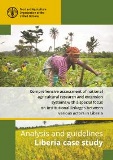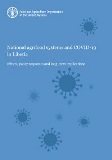Liberia
Publications

Comprehensive assessment of national agricultural research and extension systems with a special focus on institutional linkages between various actors in Liberia
2022
As part of the efforts of the Food and Agriculture Organization of the United Nations (FAO) to support and strengthen NARS’ research impacts and their links to extension service systems, the present assessment was conducted in Liberia to establish deeper insight into these challenges and opportunities. The results presented in this comprehensive report can be used to support the development and adoption of guidelines for use by the NARS.

FAO Liberia Newsletter, December 2021- Issue #1
2022
In this maiden edition, we bring you synopsis of the country programme, capacity development initiatives in Responsible Agriculture Investments, partnerships endeavours to boast aquaculture, direct inputs support to farmers, assessment of and provision of extension services, policy reforms, mobilization and training of communities on related sustainable management of natural resources, research and introduction of innovations among others.

Strengthening the institutional linkages between national agricultural research systems actors and improving agricultural research for development in Liberia
2021
This policy brief has been developed to offer specific key-recommendations and lessons learned, which the Government of Liberia could consider for strengthening its support to the NARS of the country. Ultimately, the recommendations are intended to ensure efficient adoption of the proposed methodologies for enhancing the impact of the AR4D efforts of the NARS in Liberia.

Strengthened governance of responsible investment in agriculture and food systems - Towards better processes and policies in Liberia and Sierra Leone
2022
This booklet explains the work done by FAO to strengthen capacities of key actors to enhance responsible investment in agriculture and food systems in Liberia and Sierra Leone. This work has been done under the project "Enhancing the enabling environment for responsible investment in agriculture and food systems" funded by the Federal Government of Germany.

Liberia | Data in Emergencies Monitoring brief – round 3: Results and recommendations, April 2022
2022
This Data in Emergencies Monitoring (DIEM-Monitoring) brief shares the results of a third-round field assessment conducted between September and October 2021 in Liberia. It presents key findings and recommendations for humanitarian actors to utilize in planning and implementing data-driven programming to sustain farmers’ livelihoods and build their resilience to future shocks – protecting the food security of Liberia's rural people.

Enhancing the Production Capacity of Smallholder Rice Farmers in Liberia - GCP/LIR/029/JPN
2021
Rice is Liberia’s staple food, but over 90 percent of the country’s rice needs is imported at the cost of about USD 80 million a year. The project aimed to enhance smallholder rice farmers’ capacity to increase their productivity, through the introduction of modern rice varieties and production techniques, as well as agricultural equipment, in two of the country’s three ‘breadbasket’ counties, Bong and Lofa.

Improving Forest Reference Emission Levels in Liberia for Global Reporting and Sustainable Forest Management - UTF/LIR/023/LIR
2021
The international agreement on “Reducing Emissions from Deforestation and forest Degradation, plus the sustainable management of forests, and the conservation and enhancement of forest carbon stocks” has created an opportunity for Liberia to simultaneously ( i ) manage its forests for sustainable, long term economic growth, (ii) support the livelihoods of local and rural communities, and (iii) ensure that its national and global heritage is conserved.

Enhancing Sustainability of Marine Fisheries and Improving Maritime Security in Liberia and Sierra Leone - GCP/SFW/001/JPN
2021
The project aimed to support the implementation of the Agreement on Port State Measures (PSMA) and complementary instruments, to combat IUU fishing and secure sustainable small scale fisheries and enhance maritime security in Liberia and Sierra Leone.

National agrifood systems and COVID-19 in Liberia: Effects, policy responses and long-term implications
2020
This report is part of a series of country profiles and describes: (i) policy measures enacted by the Government of Liberia to contain the spread of the virus; (ii) policies and measures to stabilize the functioning of agri-food systems; (iii) potential effects of policies on agri-food systems and vulnerable groups. Finally, the profile also assesses longer-term options for agri-food system policies and investments so as to make them more resilient.

Strengthening the enabling environment for responsible investment in agriculture and food systems – Evidence from Liberia
2021
Under its CFS Responsible Agricultural Investment (RAI) Umbrella Programme, FAO is strengthening the capacities of Liberian state and non-state actors to enhance the enabling environment for responsible investment in agriculture and food systems. This includes the present baseline study, drafted by ZOA with support from FAO; the delivery of blended learning programmes for policymakers; capacity development activities for civil society; and multi-stakeholder policy dialogue.
